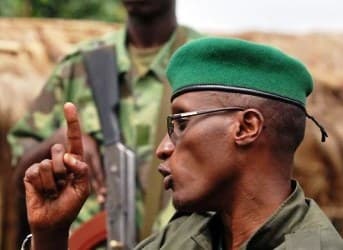The British government announced it was withholding aid to Rwanda out of concern the government there was backing the rebel M23 movement in neighboring Democratic Republic of Congo. As early as March, advocacy groups were warning that oil interests in the region could pose a real threat to a region struggling with long-standing security issues. When M23 rebels captured a provincial capital in eastern DRC recently, the International Criminal Court was quick to call for the immediate arrest of warlords there. One of the oil companies operating in DRC said it was reviewing the security situation though lingering security challenges suggest it's still too soon to work in the region.
Rebel soldiers last week captured Goma, the provincial capital of North Kivu province. British International Development Secretary Justine Greening said Friday that London was withholding $33.6 million in aid to Rwanda because of "credible and compelling reports" of Kigali's ties to the Tutsi-dominated March 23 rebel movement in eastern DRC. Rwanda had backed DRC rebels in an effort to combat the Hutu fighters who fled the country after the 1994 genocide. After the capture of Goma, the International Criminal Court called for the immediate arrest of M23 and other rebel leaders on war crimes charges.
In May, advocacy group Global Witness complained plans by oil and natural gas exploration company SOCO in DRC could exacerbate an already-tense situation in the country. The group said it was frustrated that SOCO was threatening a UNESCO World Heritage site with its campaign, but warned of broader security issues. The region, it said, faces a real threat to stability because of "ethnic tensions and the presence of armed militia groups."
Related Article: The Huge Risk-Reward Scenario In East Africa
By July, the International Crisis Group was already warning that oil interests in DRC presented a threat to stability in a region still reeling from past conflicts. If oil reserves are confirmed in eastern DRC, the ICG predicted, it could stir up tensions in North Kivu province.
"An upsurge in fighting since the start of 2012, including the emergence of a new rebellion in North Kivu and the resumption of armed groups’ territorial expansion, has further complicated stability in the east, which is the new focus for oil exploration," it warned, more than six months before the capture of Goma.
Last week, Global Witness said it was frustrated by a legal push by the U.S. Chamber of Commerce and its allies to challenge transparency measures spelled out in the Dodd-Frank Act. That measure, said Global Witness, would go a long way to decouple violence from economic interests in DRC. Without such protection, industry groups are sending a clear signal that profit motives come first in underdeveloped countries like DRC.
SOCO in early November said it was working to avoid gorilla habitats in the parts of DRC where it operates. "The security status is being assessed on a continual basis and we will only proceed when the assessment is that it is safe to do so," it said.
DRC in 2011 held its second round of election since independence in 1960. The validity of the re-election for Joseph Kabila, however, was questioned and dozens were killed after a DRC court backed his victory. Then, as is the case now, the U.N. peacekeeping mission described the situation in the country as tense. While resource development could present new opportunities for DRC, that may have to take a back seat to the resolution of grievances that date back to the bloody campaigns of 1990s.
ADVERTISEMENT
By. Daniel J. Graeber of Oilprice.com


















